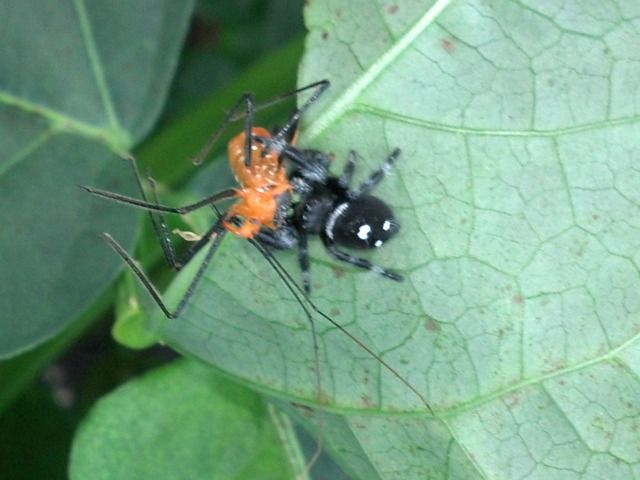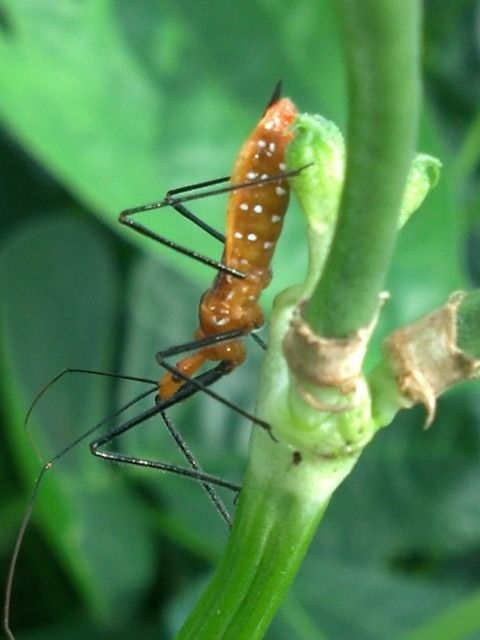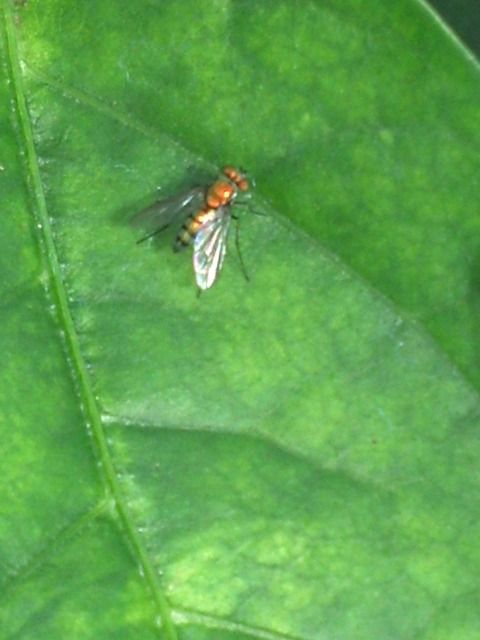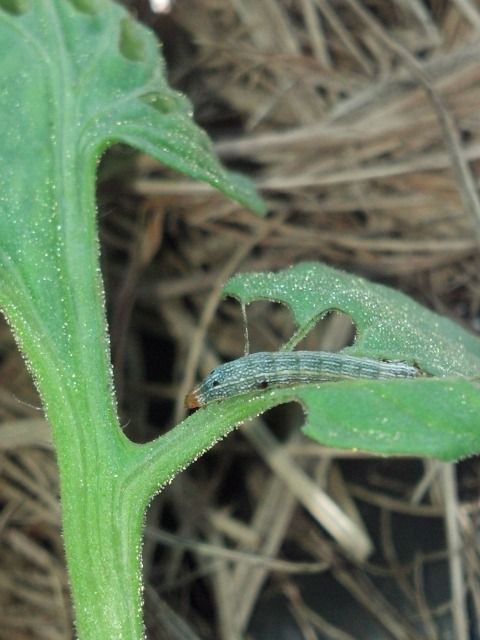

|
Information and discussion regarding garden diseases, insects and other unwelcome critters.
|
 |
|
|
Thread Tools | Display Modes |
|
|
#16 |
|
Tomatovillian™
Join Date: Oct 2011
Location: Homestead,Everglades City Fl.
Posts: 2,501
|
If you have squiggly lines in leaves like it shows in photo next to veins might be leaf miners.They inject a egg into middle of leaf.they eat ,morph into a pupae and drop into ground and come out as adult and start all over again. http://search.aol.com/aol/image?q=le...yword_rollover
__________________
KURT Last edited by kurt; October 17, 2012 at 10:08 PM. Reason: leaf miner fly |
|
|

|
|
|
#17 | |
|
Tomatovillian™
Join Date: Aug 2011
Location: Plantation, Florida zone 10
Posts: 9,283
|
Quote:
|
|
|
|

|
|
|
#18 |
|
Tomatovillian™
Join Date: Sep 2012
Location: Lake Okeechobee, Florida (zone 10-b)
Posts: 161
|
Regal Jumping Spiders are known to feed on a wide variety of other arthropods. Smaller immatures feed heavily on Diptera, while older juveniles and adults feed on large Orthoptera and Hemiptera, and larval and adult Lepidoptera . A male of P. regius was collected while feeding on an adult of Diaprepes abbreviatus (Linnaeus), a pest of citrus and sugarcane. Here is my pic of one feeding on an assassin bug while I was picking peas today. Tried to get a better pic but could not. I was also able to get a cool pic of an assassin bug.
 
__________________
Life is very short and there is no time for fussing and fighting my friends. The Beatles |
|
|

|
|
|
#19 |
|
Tomatovillian™
Join Date: Sep 2012
Location: Oklahoma
Posts: 4,488
|
Sounds like your garden is a regular battleground, with both pests and beneficials of a wide variety! That's my definition of a healthy garden!
__________________
Scott AKA The Redbaron "Permaculture is a philosophy of working with, rather than against nature; of protracted & thoughtful observation rather than protracted & thoughtless labour; & of looking at plants & animals in all their functions, rather than treating any area as a single-product system." Bill Mollison co-founder of permaculture |
|
|

|
|
|
#20 |
|
Tomatovillian™
Join Date: Sep 2010
Location: South Florida
Posts: 15
|
Loved all the pics, thanks for sharing. That first bug on the thread appeared for the first time in my yard last year and has an enormous appetite for lychee and giant potato tree leaves. This summer I finally started seeing some birds eating them and they do a good job of keeping the population contained. I don't like to spray anything and buy ladybugs, other beneficials and try to grow plants that offer food and habitat for all to keep them coming back.
|
|
|

|
|
|
#21 |
|
Tomatovillian™
Join Date: Aug 2011
Location: Plantation, Florida zone 10
Posts: 9,283
|
IMG_0121.jpg
IMG_0119.jpg IMG_0118.jpg IMG_0117.jpg IMG_0116.jpg IMG_0114.jpg Photos of whiteflies as promised. The first one is of silverleaf whiteflies, these are the type that infect tomato plants with TYLCV. Next is the sooty mildew on the top of a banana leaf where they are underneath. Next 2 are whitefly colonies on the underside of the banana leaves, they can get hundreds thick in days. Next is a type of whitefly called the spiral whitefly for obvious reasons. Last is a single spiral whitefly on a banana. THese are directly from my backyard, then multiply it by the over 2000 homes in my neighborhood, and every banana leaf, you begin to see the problem.  
|
|
|

|
|
|
#22 | |
|
Tomatovillian™
Join Date: Sep 2011
Location: Walla Walla, Washington
Posts: 360
|
Quote:
Now if I could just come up with a way to keep out the squash bugs and SVB that didn't require yards and yards of netting. |
|
|
|

|
|
|
#23 | |
|
Tomatovillian™
Join Date: Aug 2011
Location: Plantation, Florida zone 10
Posts: 9,283
|
Quote:
"Cause my photos are for sure of whiteflies, they are outside of the leaves. I have leafminers too though, but they don't kill the plant or give it tomato yellow leaf curl virus. |
|
|
|

|
|
|
#24 |
|
Tomatovillian™
Join Date: Sep 2011
Location: Walla Walla, Washington
Posts: 360
|
|
|
|

|
|
|
#25 |
|
Tomatovillian™
Join Date: Aug 2011
Location: Plantation, Florida zone 10
Posts: 9,283
|
|
|
|

|
|
|
#26 |
|
Tomatovillian™
Join Date: Sep 2012
Location: Lake Okeechobee, Florida (zone 10-b)
Posts: 161
|
Thanks Marsh for pics of the white flies. Don't think I have seen any of those, but now since I know that I must look close I will.
Kurt and Halleone. I have another pic here of a copper colored fly that I think fits into the Long legged fly of the beneficial type. http://www.floridagardener.com/critt...chopodidae.htm What do the flies look like that causes leaf miner? 
__________________
Life is very short and there is no time for fussing and fighting my friends. The Beatles Last edited by mikej; October 20, 2012 at 10:51 PM. |
|
|

|
|
|
#27 |
|
Tomatovillian™
Join Date: Oct 2011
Location: Homestead,Everglades City Fl.
Posts: 2,501
|
The pic in post 15 is what I get flying real fast and jumping from leaf to leaf on my maters.I grow all my maters in our closed in screen pool enclosure area.They get in somehow and I look for the squiggly trails and remove the leaf and stop the cycle(life).Outside the enclosure they attack mostly the soft tissue weeds and plants in the hood.
__________________
KURT |
|
|

|
|
|
#28 |
|
Tomatovillian™
Join Date: Sep 2012
Location: Lake Okeechobee, Florida (zone 10-b)
Posts: 161
|
Thanks Kurt! I have many of these green and copper colored flies. Being that they are considered a beneficial, I guess they can also be a pest then. What is the balance point that will tip the scales of being more beneficial than pest. I was just reading about leaf miners in Florida and they are caused by flies, beetles, and moths. So far I have none on my tomato plants, and very little on my peas.
__________________
Life is very short and there is no time for fussing and fighting my friends. The Beatles |
|
|

|
|
|
#29 |
|
Tomatovillian™
Join Date: Sep 2012
Location: Lake Okeechobee, Florida (zone 10-b)
Posts: 161
|
This description is long because the information is applicable to us for trying to be as organic as possible.
The beet armyworm originated in Southeast Asia. It was first discovered in North America about 1876, when it was found in Oregon, and it reached Florida in 1924. It rarely overwinters in areas where frost kills its host plants. Thus, overwintering is generally limited to Arizona, Florida, and Texas. Nevertheless, beet armyworm invades the southern half of the United States (Maryland to Colorado to northern California, and south) annually. Except in greenhouses, it rarely is a pest except in southern states. The beet armyworm has a wide host range, occurring as a serious pest of vegetable, field, and flower crops. Among susceptible vegetable crops are asparagus, bean, beet, broccoli, cabbage, cauliflower, celery, chickpea, corn, cowpea, eggplant, lettuce, onion, pea, pepper, potato, radish, spinach, sweet potato, tomato, and turnip. Larvae feed on both foliage and fruit. In Florida it is regarded as a serious defoliator of flower crops and cotton, though much of the injury is induced by insecticide use that interferes with natural enemy activity. Young larvae feed gregariously and skeletonize foliage. As they mature, larvae become solitary and eat large irregular holes in foliage. Tomato fruit is most susceptible to injury, especially near fruit maturity, but beet armyworm is not considered to be as threatening to tomato as is the corn earworm. Numerous native natural enemies have adapted to this pest. Predators frequently attack the eggs and small larvae; among the most important are minute pirate bugs, bigeye bugs, damsel bugs, and a predatory shield bug, . Pupae are subject to attack, especially by the red imported fire ant. Insecticide resistance is a major problem in management of this insect, possibly because it attacks crops such as flowers, cotton, and vegetables - crops that are treated frequently with insecticides. Beet armyworm abundance is favored by frequent insecticide use, and it is considered to be a secondary or induced pest in some crops. Also, intensive use of insecticides for beet armyworm control in vegetables such as celery has stimulated outbreaks of other pests, principally American serpentine leafminer. Beet armyworm larvae are susceptible to neem products. 
__________________
Life is very short and there is no time for fussing and fighting my friends. The Beatles |
|
|

|
|
|
#30 |
|
Tomatovillian™
Join Date: Sep 2012
Location: Oklahoma
Posts: 4,488
|
I had a bunch of those last year. This year almost none.
__________________
Scott AKA The Redbaron "Permaculture is a philosophy of working with, rather than against nature; of protracted & thoughtful observation rather than protracted & thoughtless labour; & of looking at plants & animals in all their functions, rather than treating any area as a single-product system." Bill Mollison co-founder of permaculture |
|
|

|
 |
|
|
